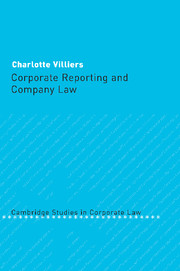Book contents
- Frontmatter
- Contents
- Preface
- Table of legislation
- Table of cases
- Introduction
- PART I GENERAL ISSUES
- 1 Disclosure theory and the limitations of corporate reports
- 2 The regulatory framework
- 3 Persons responsible for presenting corporate reports and information
- 4 Users of corporate reports
- 5 The Companies Register
- PART II FINANCIAL REPORTING
- PART III NARRATIVE REPORTING
- PART IV A WAY FORWARD
- Bibliography
- Index
1 - Disclosure theory and the limitations of corporate reports
Published online by Cambridge University Press: 23 July 2009
- Frontmatter
- Contents
- Preface
- Table of legislation
- Table of cases
- Introduction
- PART I GENERAL ISSUES
- 1 Disclosure theory and the limitations of corporate reports
- 2 The regulatory framework
- 3 Persons responsible for presenting corporate reports and information
- 4 Users of corporate reports
- 5 The Companies Register
- PART II FINANCIAL REPORTING
- PART III NARRATIVE REPORTING
- PART IV A WAY FORWARD
- Bibliography
- Index
Summary
Introduction
In the twenty-first century the disclosure concept might be taken very much for granted in company law. The standard justification for a disclosure system in the literature in the UK is that disclosure is the price to be paid for the privileges of incorporation and limited liability. The appearance is that of tremendous faith in the disclosure philosophy with increasing demands for more information to be shared. The corporate governance debate that has dominated company law since the 1990s has generated more disclosure requirements and demands for information on issues much broader than a company's financial condition. Disclosure has many theoretical objectives. In practice, however, the disclosure system is burdened with numerous problems and the costs inherent in the system lead to questions about its validity as a regulatory technique.
This chapter will explore the theoretical bases for disclosure and the problems identified with the system. The chapter will therefore begin with a brief description of the corporate reporting and disclosure system currently in place in the UK. The second section of the chapter will explore the traditional company law arguments supporting the existence of a mandatory disclosure system. That section will be followed by a description of the problems that pervade the current system. This will lay the foundation for the remainder of this book which will explore in more depth the features of corporate disclosure regulation and the challenges the system faces.
- Type
- Chapter
- Information
- Corporate Reporting and Company Law , pp. 13 - 36Publisher: Cambridge University PressPrint publication year: 2006



